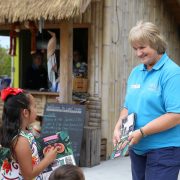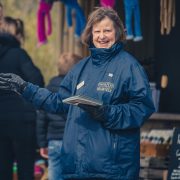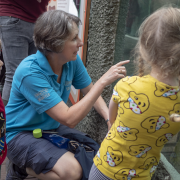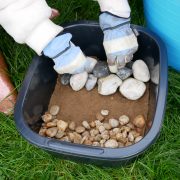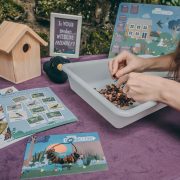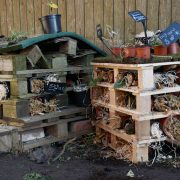Tag: learning
Our amazing volunteers donate thousands of hours of their time to the zoo every year (almost 28,000 in 2019). In their volunteering roles they support our guests to connect with wildlife, to find out about conservation and to have a great day out at the zoo. They really are an important part of our Chester Zoo family, and we know that volunteering at the zoo is an important part of their lives too.
We appreciate the contribution our volunteers make all year round, but during Volunteers’ Week we come together with others around the country to celebrate the contribution that millions of volunteers make to our society. Things are a little different this year, but the role that volunteers play has never been so important. We shall be celebrating with our volunteer team remotely and looking forwards to the day we can welcome them back into the zoo.

Here one of our newest volunteers, Julie Saville, talks about her experiences volunteering at the zoo, what being a Chester Zoo volunteer means to her and how she’s getting prepared to come back into her volunteering role:
As a child I was brought up on the edge of the Worcestershire countryside. My father loved nothing better than taking his children, and usually a few other “hangers on”, out for long walks during which we would learn about the wildlife around us. We were brought up to treasure the environment and to love animals.
I have been a primary school teacher for a large chunk of my adult- life. Although not currently teaching I would not regard myself as retired and am constantly seeking new challenges whether paid or as a volunteer.
In recent years I have been a supply teacher, which can have its rewarding moments. However, I felt that this job was no longer for me. In conversation with a dear friend he told me of the various volunteering opportunities he had taken advantage of and it occurred to me that this could be a more life enhancing use of my time. As someone who loves animals, would like to continue to work with children and loves our zoo, my attention turned to volunteering at Chester Zoo. I thrive on new challenges and prefer to be active so helping the zoo and the public ticks many boxes for me. Furthermore, it offers sufficient flexibility for other challenges to be undertaken too.
It is always a little daunting when attempting something new and interacting with unfamiliar people. But, it was apparent right from that first gathering that this was going to be worthwhile and enjoyable. Learning about all of the animals will also command some effort – I would not describe myself as uneducated, but there is much to learn in order to give guests the best experience and to answer their questions. Of course, there are also physical demands, our English weather is nothing if not unpredictable and the locations we work in vary from the warmth of the butterfly house to the more exposed Islands zone.
Getting to know so much more about all of the animals is just wonderful. I have only been able to undertake one volunteering session but found the more experienced volunteers very helpful and friendly and look forward to making many new friends once the current crisis is over.
It can be frustrating to not know as much about the animals as you would like, but, I can organise myself to research and record information during these quiet times so there is always a silver lining.
UK wildlife is in trouble. 56% of UK species are in decline. In the UK we have lost 97% of the wildflower meadows we had in the 1930s and hedgehog numbers have fallen from 30 million in 1950 to just 1 million now.
There are hundreds of UK species that need our help so we’ve created this guide to help learners explore native species, their threats and ways that you can help to make small changes to your garden that will help UK wildlife.
We worked with 146 people from 53 families and together took over 620 positive actions to support biodiversity at school and in the families own green spaces.
Our Wildlife Connections Campaign is all about bringing people together to create safe spaces for UK wildlife. By creating connections from one wildlife-friendly space to the next we can create wildlife highways through our neighbourhoods and protect the precious wildlife that we love.
Between October 2019 and February 2020 we set up Family Wildlife Clubs at five schools local to Chester Zoo, bringing together families to improve their school grounds and own green spaces for wildlife. Through this project we engaged new audiences within our local communities, providing opportunities for them to develop the skills and knowledge to be able to take action for UK wildlife and play their part in improving biodiversity.
The project was funded by the World Association of Zoos and Aquariums (WAZA) Nature Connects Grant which is awarded to international projects that aim to bring families together to experience their natural environment and take action for wildlife.
At each school site we planted mini wild flower meadows, planted trees, built giant bug hotels and made their school grounds a better place for people to enjoy. The families also made animal habitats to take home to make their green spaces better for wildlife, including making mini ponds, mini bug hotels, bat boxes and bird boxes.
By taking these actions to make more and better connected wildlife friendly spaces we can help to combat the threats faced by UK Wildlife, including the loss of suitable habitats and loss of connectivity between habitats. At each school we did basic wildlife surveys before taking action and will support the schools to monitor changes over the coming years and to promote biodiversity on their school grounds and surrounding communities.
The Family Wildlife Clubs brought intergenerational groups together to gain the skills and knowledge to make positive changes for local wildlife. As well as supporting skill and knowledge development, the experience also benefitted the participants personally and in their family relationships.
“I enjoyed spending time outdoors with my son and the group”.
– parent from Sandy Croft School
The knowledge and skills gained through the session encouraged people to take action in their own green spaces too.
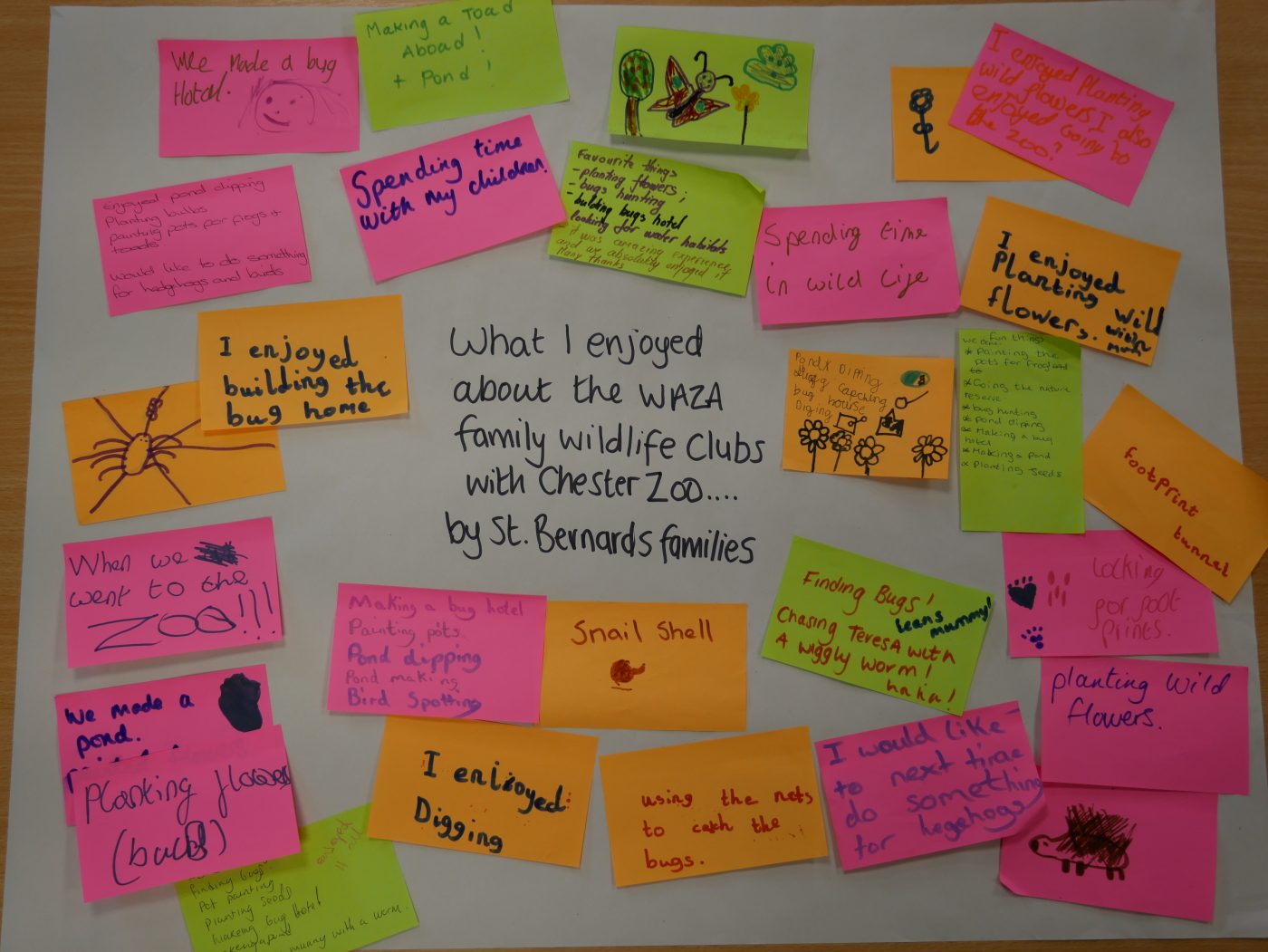
“Using knowledge of different habitats we have implemented some of the practical habitats in our gardens.”
– parent from Liscard Primary School
We’ve lost nearly 1/2 of the world’s wildlife in the last 50 years due to habitat loss, pollution and poaching. Many of the threats to wildlife are caused by humans, so it’s our responsibility to protect them in any way possible. At Chester Zoo, we work in a number of different ways to prevent the extinction of endangered animals.
Use our step by step guide to inspire your learners about some amazing endangered animals that we’re fighting to protect, show them ways in which the zoo is doing this and give them some actions to help in our mission of preventing extinction!
Did you know that over 50% of store cupboard products contain palm oil? The unsustainable production of palm oil is one of the BIGGEST threats facing the forests and wildlife of Borneo and Sumatra right now. That’s why, at Chester Zoo, we support the production of SUSTAINABLE PALM OIL.
We’re working together with partners in South East Asia to protect the incredible rainforests that are being threatened by deforestation for agriculture – mainly oil palm production. By supporting sustainable palm oil plantations, who make a commitment to be deforestation free and create wildlife corridors, we can all make a huge difference to wildlife and our mission of preventing extinction!
Our education programmes are an important part of our mission of preventing extinction. They inspire people to care about and, more importantly, take action for the natural world. We deliver a lot of our education activities with people when they visit the zoo, but we know not everyone is able to come to us.
To achieve our conservation mission, it’s important that we reach as many people as possible. So, in 2009, we took the zoo on the road and launched our free Safari Ranger outreach service, taking zoo education workshops out to schools and community groups in our local area.
We started with one Safari Ranger and a handful of workshops for primary school aged children. Over the last decade, our offer and team has grown hugely. We now work across the North West of England and into North Wales. In 2019, we delivered a huge 2,500 workshops engaging almost 80,000 participants ranging from early years groups through to university aged students, and everything in between.
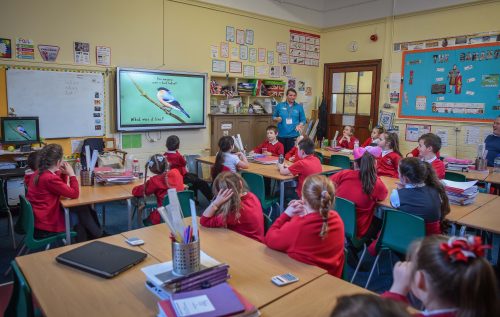
Whilst Safari Ranger workshops can be booked by any school within a 60 minute drive of the zoo, we have particularly focused our projects on those schools who might face additional barriers to visiting. We aim to work with schools who have had limited previous engagement with the zoo and who have high numbers of pupils eligible for free school meals. Projects are linked to one of our main conservation campaigns and aim to empower pupils to act for wildlife, as well as generating learning across the curriculum.
Since the pilot phase, 100s of schools have been involved in taking action for our Sing for Songbirds campaign, our Sustainable Palm Oil Challenge and more recently our Wildlife Connections campaign which focuses on the threats facing UK Wildlife. Each project involves multiple visits from our team to the school and a trip to the zoo. In some cases, families from those schools are also supported to visit the zoo with free tickets and resources linked to their children’s learning.
Rainforests are AMAZING. These incredible places cover only 6% of the Earth’s surface but they contain more than 1/2 of the world’s plant and animal species! Not only that but they can be great inspiration for learning across a whole range of subjects.
Our online learning resource platform contains more than 60 different resources to inspire learning about rainforests and rainforest species. Follow our step by step guide below to get the most out of them. By making the research more or less detailed rainforest activities can be adapted for different ages, but most of these resources are best suited to learners aged 7–11 years.
Here at Chester Zoo, we are loud and proud about the amazing conservation work our teams carry out to help PREVENT EXTINCTION around the world, but we can’t achieve this on our own.
School children, aged 9-11, have completed a ‘take-over’ of the zoo, delivering public talks to inspire thousands of visitors to take action for wildlife.
